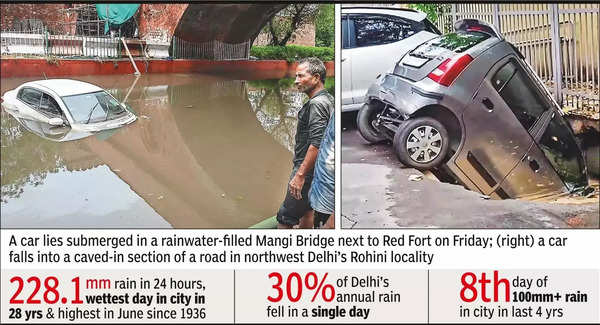NEW DELHI: Scorched and parched by record heat and dry spell over the past two months, Delhiites had been yearning for the
monsoon
. But when it arrived unexpectedly on Friday morning, it brought with it a deluge the likes of which the city hadn’t seen in nearly three decades.
The city’s base station Safdarjung recorded 228.1mm of rain in 24 hours – the highest on a single day since 1996 and the wettest day in June since 1936 – with as much as 148.5mm falling in just three hours from 2.30am to 5.30am.
IMD
promptly declared the arrival of monsoon in Delhi, revising its earlier onset forecast of June 29-30. The agency had forecast light to moderate rain for Friday but Safdarjung recorded “extremely heavy” showers, turning it into a day of traffic trauma and rain-related mishaps. In Vasant Vihar, three labourers fell into a rainwater-filled pit at a construction site and were feared dead, with search still on to find the bodies. Two boys, aged 8 and 10, drowned in a ditch in northeast Delhi’s New Usmanpur. In Greater Noida, three kids died in a wall collapse

Flooding across Delhi with a traffic gridlock and waterlogged underpasses – with spots like Minto Bridge and Pragati tunnel turning into rivers as drain capacities were breached – forced office-goers to rework their schedules.
Appointments were called off and many who ventured out in their cars were soon stranded in the swirling waters.
Hospitals turned into no-go areas and those headed for the airport to catch a domestic flight soon discovered a tragedy had unfolded there with a canopy coming unstuck and killing a cab driver around 5am. That disrupted the flight schedule.
Weather
scientists said that interaction of different weather systems had led to the high-intensity rain and cautioned that Sunday could see a repeat. The rain had been accompanied by a thunderstorm and strong, gusty winds.
“The extreme rain which inundated a large part of the city was due to monsoon trough passing directly over Delhi, one cyclonic circulation over UP and another over Punjab and adjoining areas. This fed additional moisture to the region. The interaction of these weather systems happened over Delhi which led to extreme rain,” said Mahesh Palawat, vice chairman, meteorology and climate change, Skymet. The maximum rainfall, 148.5mm, was recorded between 2.30am and 5.30 am, and 74.4mm between 5.30am and 8.30am, on Friday. An additional 5.2mm was recorded between 8.30am and 11.30am Thursday, making the cumulative 24-hour rainfall 228.1mm.
Palam recorded 106.6mm of rainfall, Lodhi Road 192.8mm and the Ridge area 150.4mm. The showers brought about a sharp drop in temperature. The maximum
temperature
at Safdarjung was recorded at 32.5 degrees Celsius, five notches below normal and lowest since May 1 against 35.4 degrees Celsius a day earlier. The minimum temperature was 24.7 degrees Celsius, three notches below normal as against 28.6 degrees Celsius a day earlier.
After 8.30am on Friday, Safdarjung along with most of the areas recorded only a drizzle or trace level rain that is too less to be recorded. Palam recorded an additional 0.4mm and Lodhi Road 1mm.
An IMD statement later said that the southwest monsoon had advanced into more parts of west Rajasthan, remaining parts of east Rajasthan, some parts of Haryana, entire Delhi, some more parts of western and eastern UP and remaining parts of MP, Chhattisgarh, West Bengal, Jharkhand and Bihar. It added that conditions are favourable for the monsoon to advance further into Uttarakhand and Himachal Pradesh during the next two-three days.
The weather department expects the downpour to continue and has issued an orange
alert
for moderate to heavy rain on Saturday and heavy to very heavy rain on Sunday.
Meanwhile, the air quality of the city continued to be satisfactory with AQI of 64 against 79 a day earlier.

